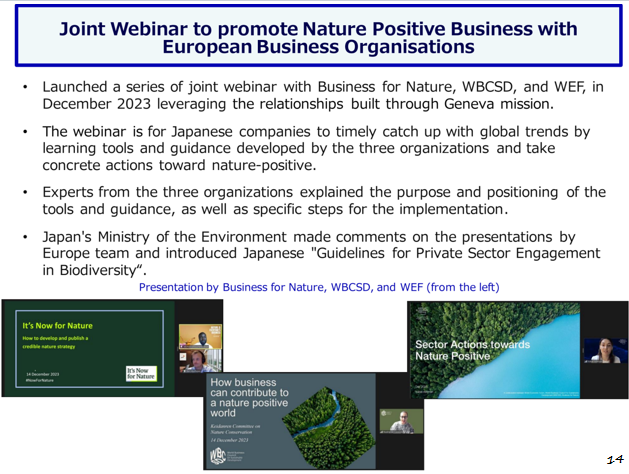Japan: SDGs integrated into management & rising nature-positive management
2024-06-21GoldenBeeGoldenBee0
On June 14, 2024, at the 19th International CSR/ESG Forum, Masao Seki, Steering Committee Chairman, Council for Better Corporate Citizenship (CBCC), shared recent key trends and challenges of sustainability in Japan, focusing on the corporate progress of business and human rights, and the growing interest in biodiversity and nature-positive management, based on the latest survey results of the member companies of the Japan Business Association (Keidanren).

Here are the main points of the speech:
CBCC was established in 1989 in Japan with the support of Keidanren. Our mission is to support Japanese companies in their sustainability and sustainability management initiatives. Keidanren is a comprehensive economic organization with more than 1400 leading Japanese companies as its members. As sustainability management is gaining increasing importance, CBCC collaborates very closely with Keidanren and its related organizations to promote initiatives in this field.
Since The Charter of Corporate Behavior was developed in 1991, Keidanren has encouraged its member companies to adhere to it as the cornerstone for sustainability management. The preamble of the charter carries a strong message: "corporations shall take the lead the way in the realization of a sustainable society”. The charter encourages member companies to work towards the SDGs.
According to the latest survey of Keidanren member companies published in January this year, the number of companies integrating SDGs into their management has significantly increased compared to the previous survey three years ago.
Keidanren's initiative, Society 5.0 for SDGs, which aims to achieve the SDGs through the realization of a human-centered super-smart society, has been embraced by member companies, meaning that SDGs are increasingly being integrated into corporate management.
The survey also explored the importance of dialogue and collaboration with stakeholders on SDGs initiatives. These actions involve a wide array of stakeholders, including employees, business partners, industry groups, investors, local communities, and the civil sector, indicating a significant and important development of the breadth of engagement.
Keidanren has been advocating for member companies to follow The UN Guiding Principles on Business and Human Rights. One highlight of the survey results is the big increase in the proportion of companies making efforts to implement these principles, from 36% in the previous survey to 76% in the latest survey over the past three years, meaning the implementation of human rights due diligence has rapidly gained traction among companies.
However, there is a noticeable disparity based on company size; while 95% of large companies with over 5,000 employees have implemented these measures, the rate is significantly lower among smaller companies, indicating that challenges still remain.
The survey indicates that companies are focusing on a wide range of rights holders and issues, showing a broader and deeper commitment to human rights than we had anticipated. Meanwhile, they still face challenges in their human rights efforts, such as not knowing the scope of their efforts or lacking sufficient personnel and budget; some complex issues cannot be resolved by a single company, such as difficulties in identifying issues due to complexity and vast size of supply chains, underscoring the need for collaborative solutions with other stakeholders.
At the same time, biodiversity is an area of rapidly growing interest. The Japanese government is also actively engaged in this area, having announced The National Biodiversity Strategy and Action Plan 2023-2030 in November in 2023 and The Nature Positive Economic Transition Strategy in March 2024. This strategy sets targets such as having 50% of large companies implement nature-positive management by 2030 and having 1,000 organizations declare their commitment to nature-positive initiatives, promoting public-private collaboration.
Keidanren has been proactive in this field, and established the Keidanren Committee on Nature Conservation (KCNC)in 1992. KCNC aids and promotes partnerships with civil society organizations involved in nature conservation worldwide, engages in policy recommendation and global standards development, and promotes awareness and initiatives among member companies.
At the Davos meeting this year, 320 global companies committed to early disclosure of information based on TNFD guidelines by 2025. Japan had the highest number with 80 companies, a testament to the impact of Keidanren and KCNC's efforts.
KCNC continues to promote nature-positive management by hosting webinars and other events for member companies in collaboration with leading global initiatives. This following slide shows an example of such an event where we discussed the perspectives and industry-specific standards proposed by organizations like the WBCSD, World Economic Forum, and Business for Nature.

In summary, I have shared insights from the survey of Keidanren member companies, highlighting progress in business and human rights, and on the growing interest and rapid development in nature-positive management.
Best Practices
- The 100-year brand — Air Liquide also has a sense of juvenile
- Beijing Public Transportation Corporation: Developing green transportation to build a harmonious and livable capital
- CGN: Building a modern factory in barren deserts and developing a new win-win cooperation model along “Belt and Road”
Upcoming Event

All the materials on the site “Source: XXX (not from this site)” have been reprinted from other media. They do not imply the agreement by the site.
All the materials with “Source: CSR-China Website” are the copyright of CSR-China Website. None of them may be used in any form or by any means without permission from CSR-China Website.
GoldenBee Official WeChat
Copyright © Csr-china.net All Right Reserved.
京ICP备19010813号










